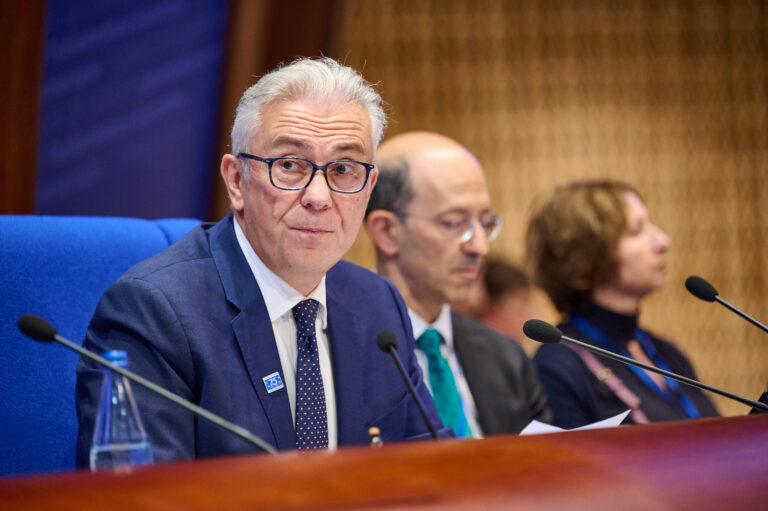The president of the Parliamentary Assembly of the Council of Europe (PACE) has acknowledged that progress has not been made in addressing human rights violations in Turkey, particularly regarding key European Court of Human Rights (ECtHR) rulings and the treatment of Kurdish politicians, the TR724 news website reported.
During a press briefing following the autumn session in Strasbourg, PACE President Theodoros Rousopoulos responded to a question from Ensar Nur, a TR724 correspondent, about Turkey’s ongoing defiance of ECtHR rulings and the repression of opposition figures.
Turkey refused to comply with landmark ECtHR rulings, particularly in the cases of imprisoned philanthropist Osman Kavala, Kurdish leader Selahattin Demirtaş and former teacher Yüksel Yalçınkaya. In each case, the ECtHR had found violations of their fundamental rights, but the Turkish government has refused to implement these rulings and continues its crackdown on opposition groups and perceived dissidents.
Kavala and Demirtaş, high-profile figures who have been imprisoned for years on politically motivated charges, have become symbols of the Turkish government’s growing authoritarianism and its disregard for judicial independence. In both cases the ECtHR had ruled that Turkey’s actions violated their rights to a fair trial and freedom of expression; yet the Turkish authorities have ignored these judgments.
More recently, in September 2023 the Grand Chamber of the ECtHR ruled in favor of Yalçınkaya, finding that Turkey had violated his rights under three articles of the European Convention on Human Rights. Despite this, a local court in Kayseri re-convicted Yalçınkaya last month on terrorism charges, sentencing him to the same six years, three months in prison as his original 2017 conviction. The ruling was based on his alleged use of a messaging app, membership in a labor union linked to the faith-based Gülen movement and his account at Bank Asya, all of which were classified by Turkish courts as evidence of terrorist activities.
The Gülen movement, inspired by Turkish cleric Fethullah Gülen, is accused by the Turkish government and President Recep Tayyip Erdoğan of masterminding a failed coup in 2016 and is designated as a “terrorist organization,” although the movement denies involvement in the coup attempt or any terrorist activity.
Despite the ECtHR ruling that ordered the Turkish government to redress Yalçınkaya as well as submit an action plan to address systemic issues that resulted in thousands of unjust convictions, detentions and prosecutions of alleged Gülen followers continue based on activities that have been classified as criminal by Turkish courts, but not by the ECtHR.
Despite the council’s efforts to engage Turkey on these issues, Rousopoulos admitted that they had not achieved the results they desired in pushing for the release of these figures or in securing compliance with ECtHR rulings.
Another key issue raised during the session was the removal and imprisonment of Kurdish mayors from the Peoples’ Democratic Party (HDP), predecessor of the current pro-Kurdish Peoples’ Democracy and Equality Party (DEM Party). Since 2019 Turkish authorities have systematically removed elected Kurdish mayors from office, replacing them with government-appointed trustees. Many Kurdish mayors, representing major cities such as Diyarbakır, Van and Mardin, have been imprisoned on what critics describe as politically motivated charges, often related to terrorism accusations.
DEM Party candidates won these municipalities back in local elections in March of this year, and although no large-scale removal of mayors took place, there was an attempt to remove the mayor of Van, and southeastern Hakkari’s Kurdish mayor was recently removed.
This crackdown on Kurdish politicians is part of a broader effort by President Recep Tayyip Erdoğan’s government to silence political opposition and dismantle Kurdish political influence. They have long been targeted by the state under accusations of links to the Kurdistan Workers’ Party (PKK), which Turkey considers a terrorist organization. However, human rights groups argue that arrests of these politicians violate democratic norms and suppress legitimate political activity.
PACE President Rousopoulos acknowledged the gravity of the situation, stating that the removal and detention of Kurdish mayors were well known to the council.
Rousopoulos said the Council of Europe and the ECtHR stand firmly by their rulings in these high-profile cases but emphasized that pressure must be directed at the Turkish government.
“It is the government that we have to press,” he said, adding that the opposition parties in Turkey are not in a position to implement these court decisions. He reassured the press that the council is not ignoring these violations and will continue to raise the issue, but admitted that “silent diplomacy” has so far not been effective in achieving tangible results.
While the Council of Europe has tried to maintain dialogue with the Turkish government in an effort to avoid a complete breakdown of relations, this strategy has yet to yield significant progress. The PACE president acknowledged that “silent diplomacy” has limits, particularly when faced with a government that continues to disregard international legal norms.
The council’s reluctance to take harsher measures, such as suspending Turkey’s membership, is tied to concerns that doing so would sever Turkey’s ties with European institutions, including the ECtHR. Such a move would likely leave Turkish citizens without recourse to the court, further isolating them from European human rights protections.
Despite these challenges, Rousopoulos assured that the council remains committed to pressuring the Turkish government to implement ECtHR rulings and address its widespread human rights abuses. However, with little progress on the horizon, frustration is mounting among human rights advocates both inside and outside Turkey, who feel that Europe’s response has been insufficient.
The PACE president highlighted that Turkish opposition leaders are regular visitors to the council’s sessions, where they discuss ongoing human rights violations and the lack of progress on key rulings. He cited recent meetings with Republican People’s Party (CHP) leader Özgür Özel and DEM Party representatives, where they shared their concerns about the deteriorating situation in Turkey.



